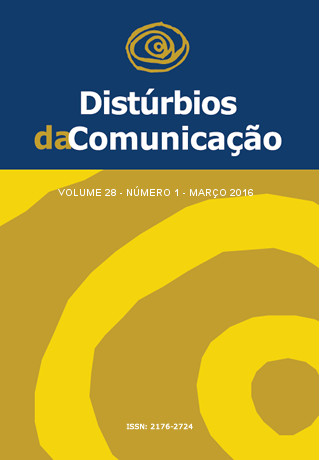Study of words repetitions in adults with or without stuttering
Keywords:
Speech, Language and Hearing Sciences, Stuttering, Speech Disorders, Evaluation, Adult..Abstract
Introduction: Speakers show disfluencies that can be classified as stuttering-like disfluencies (SLD), typical manifestations of person who stutters, or as other disfluencies (OD), which are common in any speaker’s speech. People who stutter show high amount of SLD. Objective: to analyze word repetition in the speech of adults who do and do not stutter regarding the type (monosyllabic - MWR or non - NMWR), the frequency of occurrence, the position of the word repeated in relation to the sentence, the presence of muscle tension and/or physical concomitant, and to the number of repetitions. Method: Participants were 30 adults, 18-46 years old, divided in: RG (research group) with 15 adults who stutter and CG (control group) with 15 adults who do not stutter. The following procedures were applied: clinical and familial history, fluency assessment and Stuttering Severity Instrument. Results: The results obtained were significant for the comparison between the groups: adults who stutter showed more MWR and NMWR in relation to the total of the speech and the total of disfluencies. RG showed more MWR with tension and greater number of repeated units for the MWR when compared to the CG. Conclusion: Adults who stutter showed higher incidence of monosyllabic and non-monosyllabic word repetition in relation to fluent adults. Muscle tension presence and the occurrence of monosyllabic words repetitions in initial and medial positions were more frequent in adults who stutter.Downloads
Download data is not yet available.
Metrics
Metrics Loading ...
Downloads
Published
2016-03-31
Issue
Section
Artigos
License
Copyright (c) 2016 Luana Altran Picoloto, Cristiane Moço Canhetti Oliveira

This work is licensed under a Creative Commons Attribution 4.0 International License.









